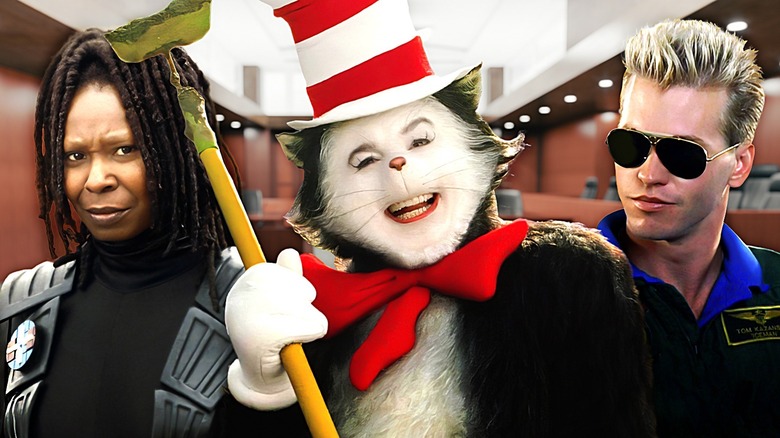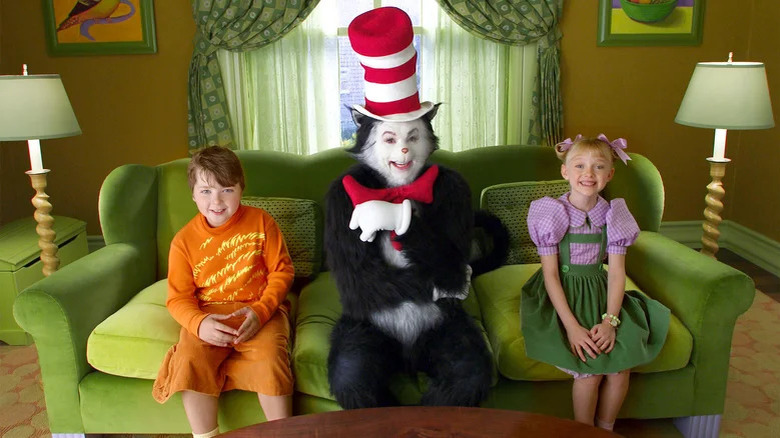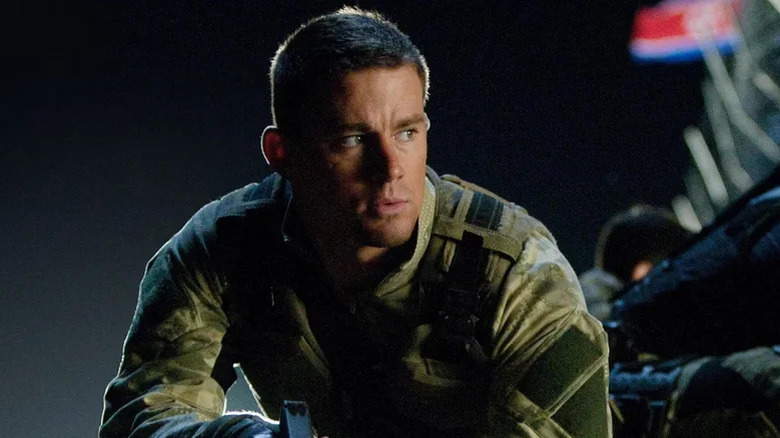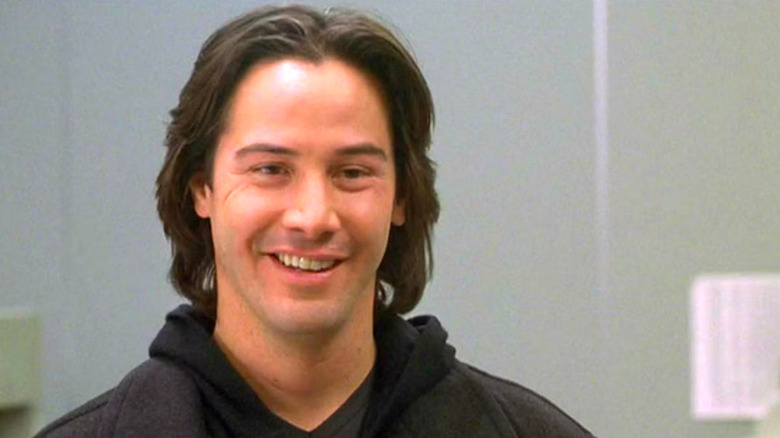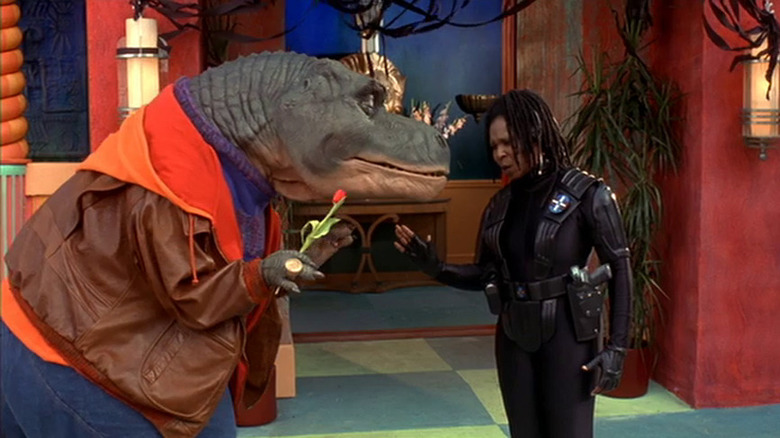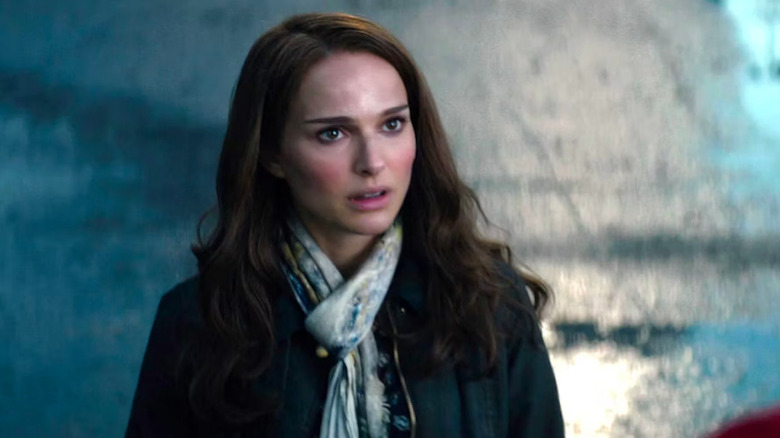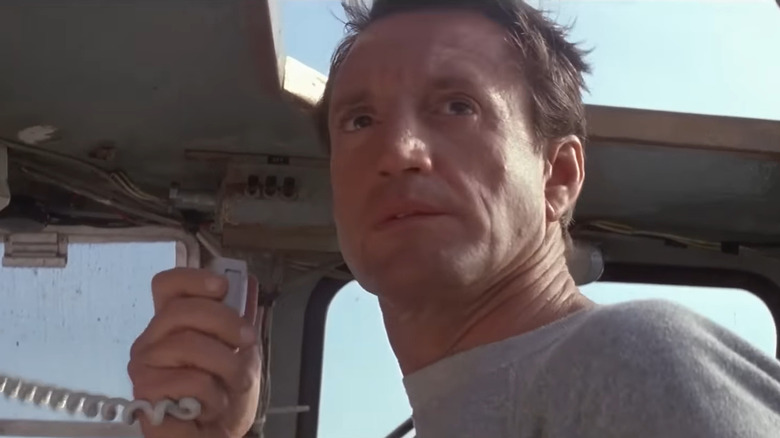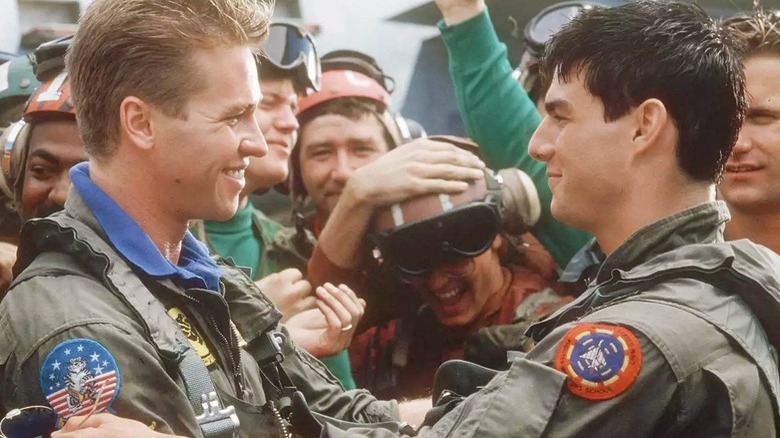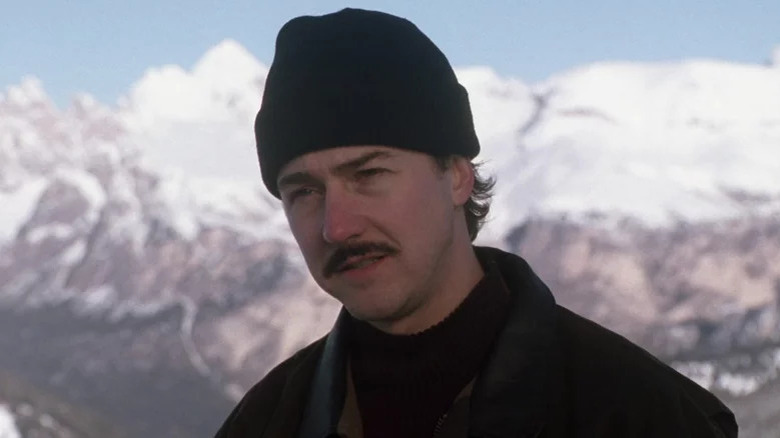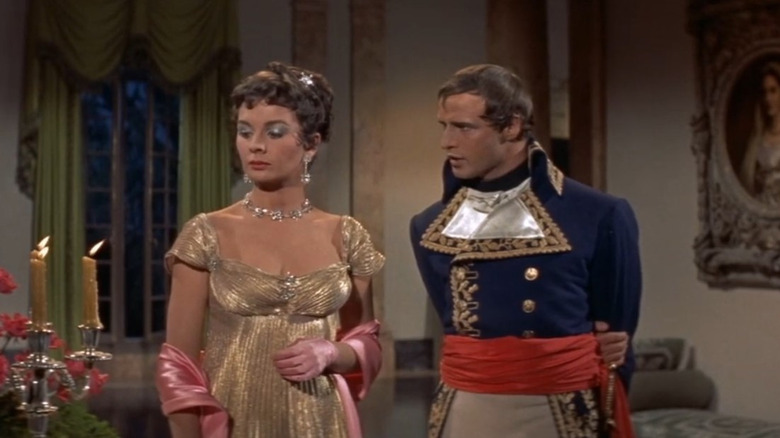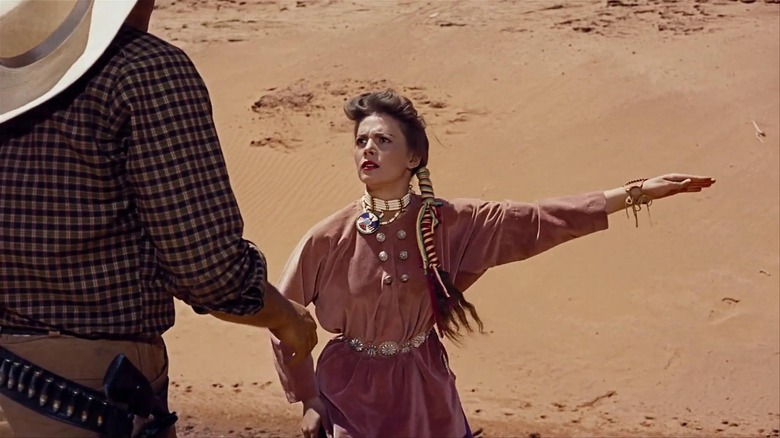10 Actors Who Were Legally Forced To Star In A Movie
When you think of actors getting trapped in unfair contracts, your mind probably goes to the era of Old Hollywood and the studio system, when stars worked for one studio and one studio only, sometimes making as many as five films a year for their corporate bosses. This system started falling apart in 1948 due to a Supreme Court case that led to the Paramount Decrees, a group of antitrust laws that broke up the studios' Hollywood monopoly.
Though the Paramount Decrees ended in 2020, the landmark Supreme Court ruling forever changed how Hollywood operated. Of course, actors still sign contracts with studios that limit their ability to choose which projects they take on. Hollywood is a business above all else, and the bosses want to make as much money off their actors as they possibly can. As such, lawsuits between actors and studios are more common than you might think, revealing a darker side to Hollywood behind all the glitz and glamor.
In some cases, the reason an actor makes a movie is not because they love the material, but because they have to, or else they might get sued. Here are 10 examples of actors who starred in films against their wishes.
Mike Myers – The Cat in the Hat
"The Cat in the Hat" is far from one of the most beloved films in comedy legend Mike Myers' filmography. In fact, it's probably one of his most hated films, if its 10% score on Rotton Tomatoes is any indication (though it still climbed Netflix charts in 2024). In retrospect, Myers was right not to want to star in the movie, but a legal dispute gave him no choice.
It all started when production fell through on the Universal film "Dieter," based on Myers' character from "Saturday Night Live." Universal sued Myers, claiming that he reneged on his commitment to do the film. Imagine Entertainment, who had also signed on to produce the film, sued Myyers as well. The comedians responded with his own countersuit, claiming that he had final script approval, and since he wasn't satisfied with the script, he had the right to walk away. The matter was settled when Meyers agreed to make his next film with Universal — a film that would become "The Cat in the Hat."
At the time, Myers had high hopes for the as-of-yet unnamed project, saying in a statement (per The BBC), "In regard to the resolution, I'm glad to put all of this behind me, and I'm looking forward to doing a movie that we can all be proud of." That didn't quite happen. According to Amy Hill, who also acted in the film, shooting was a "horrible, nightmarish experience," mainly because of Myers' diva-like behavior on set. It's hard to believe either party got what they wanted out of this particular compromise. Harumph!
Channing Tatum – G.I. Joe: The Rise of Cobra
It's not often that an actor gets candid and reveals which films in their career they truly hated, but that's exactly what happened when Channing Tatum sat down with Howard Stern on his radio show. Stern brought up the film "G.I. Joe: The Rise of the Cobra" as an example of one of Tatum's breakout roles, and Tatum was amused by the suggestion. "I'll be honest, I [expletive] hate that movie," Tatum revealed.
So why did he do it? It all goes back to his first film, "Coach Carter." As part of his contract for the movie, Tatum signed a three-picture deal with Paramount, which seemed like a good idea at the time. But Tatum was less-than-thrilled when, several years later, the studio called up and asked him to do "G.I. Joe." Tatum loved the series as a kid, and his favorite character was Snake Eyes, but Paramount wanted him to play the lead, Duke. He didn't think the script was good, and he didn't want to ruin his fond childhood memories of the show, but he had no choice. "You're doing this, or we're gonna sue you," is how Tatum put it to Stern.
At this point in his career, Tatum has no hard feelings about the movie, and its box office success isn't something to scoff at either. "I'm super lucky and blessed to have been given that film," Tatum admitted. Plus, the fact that his character was killed off in a later film means he'll (probably) never have to reprise the role.
Keanu Reeves – The Watcher
One of Keanu Reeves' biggest flops was a movie he was basically tricked into doing, though the behind-the-scenes drama was initially kept secret. In 2000, Reeves played the lead in a film called "The Watcher," which follows a serial killer as he stalks a retired FBI agent (played by James Spader). According to Reeves, he was forced to star in the film because his friend forged his signature on the contract. He decided to do the film rather than involve himself in a legal debacle.
To make matters worse, The Guardian reports that he was initially promised a small role in the film, rather than the lead, and was paid $1.5 million less than his co-star, Spader. Though it did fine at the box office, the film was critically panned, and many took aim at Reeves' performance in particular. Short of getting Angela Lansbury or Rodney Dangerfield or Lassie for the part, the miscasting could not be more complete," wrote The Guardian's Peter Bradshaw.
Reeves refused to promote the film prior to its release, and a clause in the contract meant he couldn't speak ill of the picture for a full year. "If it's September, that means it's been a year, so I can finally talk," he told the Calgary Sun when he was finally able to explain the situation.
Whoopi Goldberg – Theodore Rex
Have you ever wondered why Whoopi Goldberg starred in a film alongside a talking dinosaur? It wasn't because she wanted to, that's for sure. In fact, Goldberg did everything she could to get out of the movie. When producers approached Goldberg with the film "Theodore Rex", she initially said yes, but later backed out once the project got rolling. Producer Richard Abramson sued Goldberg for $20 million for going back on a "verbal pact" to star in the movie. Goldberg filed a countersuit, but things didn't go her way because of a pesky piece of '90s technology.
You see, Abramson was on the phone with Goldberg when she told him, "I'm 100% committed, I'm 100% behind this," and his answering machine recorded the conversation (via Slash Film's oral history of the film). Abramson and his lawyers brought the recording to court, and though Goldberg's team argued it was an illegal recording, the deliberation continued. They eventually reached an agreement, paying Goldberg $7 million to star in the film, but it was clear to everyone that the lawsuit was a terrible idea.
Abramson remembers sitting down to talk with Goldberg during their final mediation session, where she told him, "Maybe in 10 years, you and I can have a cup of coffee and laugh about this. But you've made my life a living hell, and I hate your [expletive] guts." Stefano Ferrari, another producer on the film, shared that Goldberg would call him a "mother-[expletive]" every time she would see him on set. To add insult to injury, the movie went straight to TV and video rather than releasing in theaters, begging the question: was any of that worth it?
Natalie Portman – Thor: Dark World
It's almost universally agreed that "Thor: Ragnarok" is the best of the "Thor" movies, but unfortunately, Natalie Portman missed out on the "Thor" renaissance. Instead, Portman starred as Jane Foster in the other three "Thor" movies. This includes "Thor: Dark World," which star Chris Hemsworth described as "meh" and Christopher Eccleston said made him want to die.
So how did a talented and intelligent actor like Portman get stuck with such a clunker? Broken promises, that's how. According to The Hollywood Reporter, Portman wasn't sure about acting in the second "Thor" film, but she came back on board because Patty Jenkins was set to direct, a position that would make her the first woman to direct a superhero movie of this size. (As we all know, Jenkins made history by directing "Wonder Woman" instead.)
Sources at Marvel claimed that they fired Jenkins because she lacked clarity and decisiveness, but Jenkins' camp maintained that she had an extremely clear vision for the film that the studio wouldn't stand behind. Whatever the reason for Jenkins' firing, Portman was said to be very upset by the change in leadership. However, because she had already signed a contract for the film, Portman couldn't get out of her obligation and had to grin and bear it through one of Marvel's most mediocre offerings.
Roy Scheider – Jaws 2
"Jaws 2" is the best of the "Jaws" sequels, but that isn't saying much. Nothing can beat the original, and without Steven Spielberg at the helm, the film lacks any sense of ingenuity. Though the famed director declined to be involved in the sequel, "Jaws" hero Roy Scheider wasn't so lucky. Like many of his colleagues in the industry, Scheider was under contract with Universal for a three-picture deal. Though cast in "Deer Hunter," Scheider dropped out two weeks before filming started, opening the door for Robert De Niro to star in the film.
According to "Roy Scheider: A Film Biography" by Diane C. Kachmar, Universal agreed to forgive his violation of the contract if he starred in "Jaws 2," which Scheider wasn't too keen on doing. In fact, Scheider wanted to get out doing the film so badly that he "pleaded insanity and went crazy in The Beverly Hills Hotel," writes Kachmar. The actor was offered four times more than his salary in the first film, which must have smoothed things over considerably, though the mood on set remained tense.
As far as Spielberg is concerned, he's always maintained that the reason he said no to "Jaws 2" was because he had such a terrible time being on the water all day for the first film. However, as he shared in an interview with Ain't It Cool News' Eric Vespe in 2011, "I wasn't happy with the sequel, and I realized I had let a franchise go that I could have made a good contribution to."
Val Kilmer – Top Gun
Apart from Tom Cruise as Maverick, the most memorable character in "Top Gun" is his nemesis-turned-friend, Iceman, played by Val Kilmer. Despite it being one of the biggest roles of his career, Kilmer had no interest in being in the film when he first heard about the project. In his memoir, Kilmer revealed that he was totally uninterested in the story and that his agent "tortured" him into meeting with director Tony Scott.
"I read the lines indifferently. And yet, amazingly, I was told I had the part. I felt more deflated than inflated. I had to get out of there," Kilmer writes. But get out of there he could not. As Kilmer shared in the 2021 documentary "Val," "I was under contract with the studio, so I didn't really have a choice."
In this case, Kilmer being forced to star in the film was actually a good thing. Indeed, Kilmer enjoyed making the movie so much that he couldn't miss the chance to be in the sequel, despite health struggles (which actually became part of his character in "Top Gun: Maverick"). As Kilmer explained, "I'd not only contacted the producers but created heartrending scenes with Iceman. The producers went for it. Cruise went for it, and he actually wouldn't have done the movie without Kilmer. Cruise couldn't have been cooler," he writes in his memoir. Sometimes Hollywood stories do have Hollywood endings, after all.
Edward Norton – The Italian Job
While F. Gary Gray's "The Italian Job" may not seem like a very controversial movie, years of contractual disputes led to the final cast list. Edward Norton stars alongside big names like Mark Wahlberg, Jason Statham, and Charlize Theron in the heist movie. But Norton and his legal team contend that it was Paramount Pictures who pulled off a heist in order to get him in the film.
Norton first got his start with Paramount when he appeared in the 1996 movie "Primal Fear." Norton signed a contract with Paramount, stating he would be required to make two additional films with the studio, being paid $75,000 for the first and $125,000 for the second. Norton's star rose quickly and he was cast in several popular films in the latter half of the decade. In 1997, Norton began negotiations to star in "Fight Club," thinking his contract with Paramount had expired. Paramount maintained that was not the case, arguing that Norton was obligated to star in one of their films instead.
Norton wanted the role in "Fight Club" so badly that he negotiated the terms of his contract with Paramount, which now stipulated he would have to do one more film with the studio for a payment of $1 million. Paramount chairman Sherry Lansing supposedly told Norton he would never be forced to star in a film, so the news that he had no choice but to do "The Italian Job" angered him greatly. Though Norton declined to comment on the situation, his lawyer, Marty Singer, slyly told Observer, "If you want the best possible performance and the best possible movie, you wouldn't want to force an actor of his caliber to perform against his will."
Marlon Brando – Désirée
The great Marlon Brando is best known for playing brooding anti-heroes, characters like Vito Corleone in "The Godfather" and Terry in "On The Waterfront." A theatrically-trained actor, Brando had love for the classics, as evidenced by his role in Joseph L. Mankiewicz's "Julius Caesar," but costume dramas were not exactly his style. Brando was under contract to star in the 1954 historical drama "The Egyptian," but he walked out of his obligation, and the role later went to Edmund Purdom. 20th Century Fox was not happy with Brando's disappearance, and sued him for a hefty $2 million. The result was the 1954 film "Désirée," a project that, in retrospect, seems ill-fitting for Brando.
Based on the novel of the same name by Daniel Taradash, the film tells the supposedly true story of Napoleon Bonaparte and his lover Désirée Clary (Jean Simmons), who he met prior to marrying Josephine. According to TCM, Montgomery Clift was approached to be in the film but turned it down, leaving Brando with a role he wasn't happy with. Director Henry Koster later shared that Brando "didn't want to play Napoleon, and he was right, because Marlon is an introvert and Napoleon was a blasting extrovert." In his autobiography, Brando added his opinion to the mix, writing that "Désirée was superficial and dismal, and I was astonished when told that it had been a success."
Indeed, many reviews, such as this scathing one in the New York Times, criticized the film for being all style, no substance, though it did well at the box office. The film's Academy Award nominations reflected this disparity, as it received nominations solely for Best Art Direction and Best Costume Design.
Natalie Wood – The Searchers
Natalie Wood started acting at the ripe age of four, but her first introduction to the world as a young woman rather than a child was alongside James Dean in "Rebel Without a Cause." The film marked a turning point in her career, but it came with a cost. According to Gavin Lambert, who wrote a book about Wood, she was only allowed to do "Rebel Without a Cause" if she signed a seven-year contract with Warner Bros. As Lambert puts it, "Most of that was really seven years hard labor."
One of the films she made under this contract was John Ford's "The Searchers," which starred John Wayne. She did not think the part was right for her, and it was a fairly small part at that. Plus, she was terrified of John Wayne, and for good reason. She got a terrible sunburn that needed medical attention the day before shooting in Arizona, and Wayne was not happy. According to his son, Pat Wayne, Wayne Sr.'s response to Wood's predicament was, "Tell her to go [expletive] in her hat."
Wayne eventually came to see her and realized the seriousness of her condition, but she never got over her dislike of him or the film. Despite Wood's dismal experience on set, "The Searchers" has since been recognized as an important and influential American film, with Martin Scorsese listing it as one of his biggest influences.
